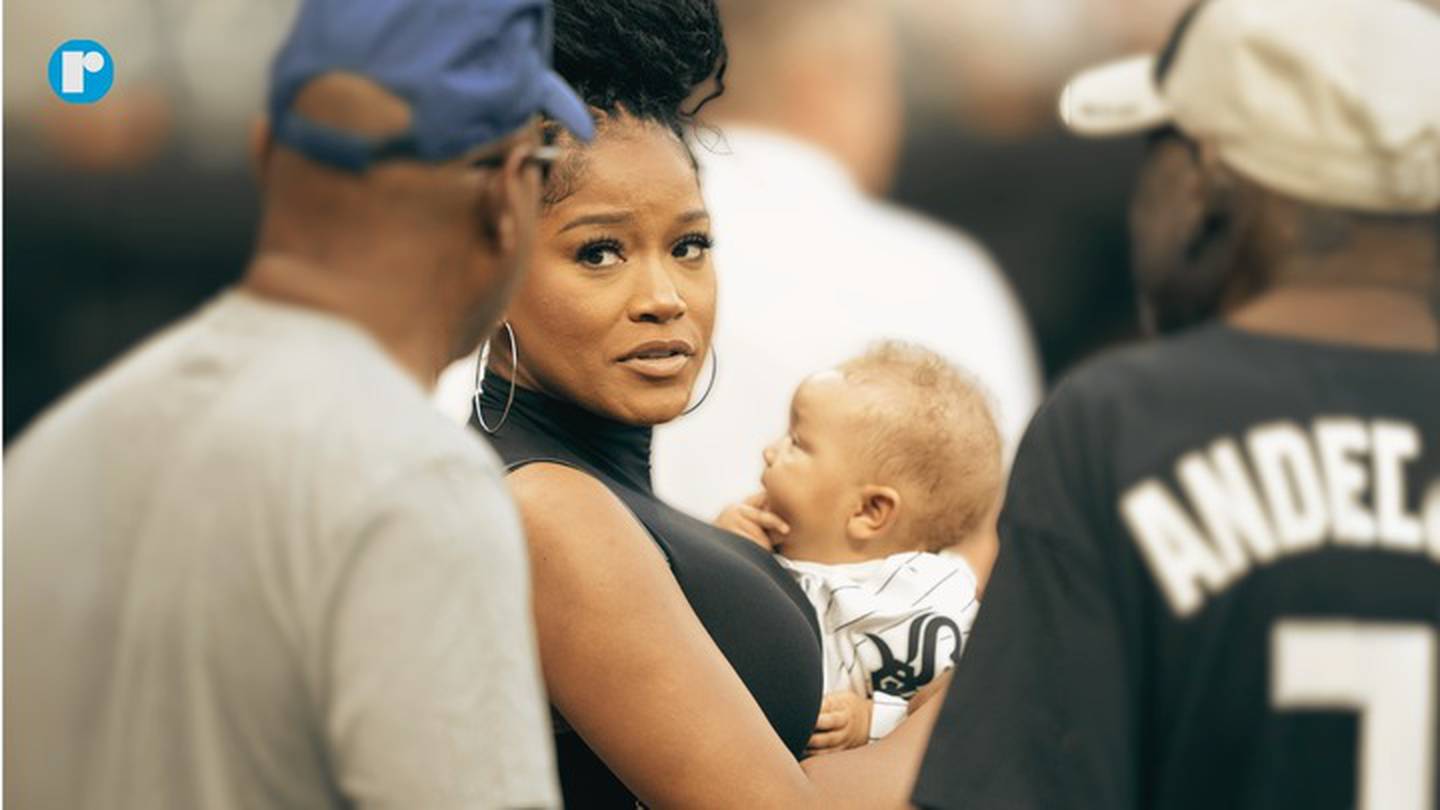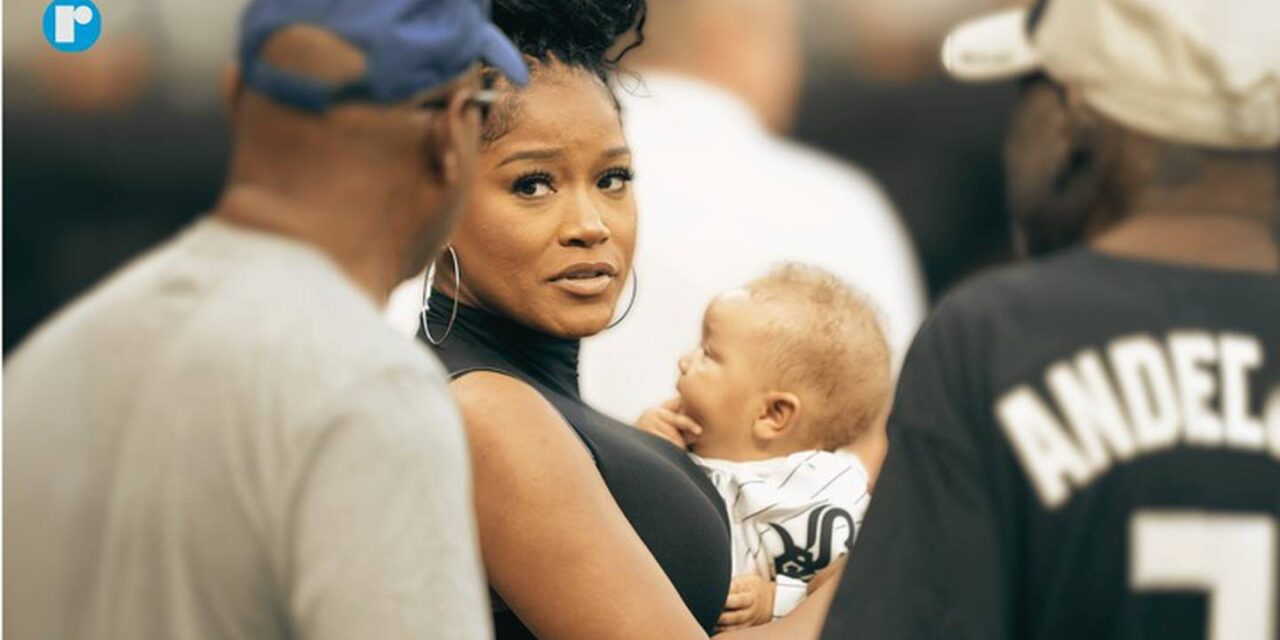
Reports hit the internet on Thursday of Keke Palmer filing a restraining order against Darius Jackson, ex-boyfriend and father of her 8-month-old son, detailing the alleged physical and mental abuse she endured over their two-year relationship.
This isn’t the first time this relationship has made headlines.
The couple’s relationship came under public scrutiny in July, in response to Jackson’s tweet about the sheer, black Givenchy dress Palmer wore to an Usher show in Las Vegas. “It’s the outfit tho… you a mom.” Jackson said in a tweet that has since been deleted. The internet was not having it.
But what the public didn’t see, according to a report filed by Palmer, was the physical and verbal abuse that happened behind closed doors – at times in front of their child.
Thursday’s report Palmer describes “many instances of physical violence, including striking and grabbing me around the neck, descriptions of Darius destroying my personal property, including diaries and prescription eyeglasses, throwing my belongings into the street, throwing my car keys to prevent me from driving away, hitting my in front of our son, spewing profanities about me to our son, threatening to kill himself with a gun if I left him, harassment, and other physical and emotional abuse.”
Details of the case continued to leak, as Radar Online released screenshots of security footage from an alleged attack on Nov. 5, in which Jackon entered Palmer’s house unannounced and physically abused her.
In a video posted on Instagram, Shayla Davis, Palmer’s mother, she says that she approached Jackson’s brother about the abuse over a year ago, and although the exact timeframe of these incidents are unclear, that leaves the potential for the alleged abuse to have occurred while Palmer was pregnant.
Palmer’s story shines a light on a dangerous reality for many pregnant people. Homicide is now the leading cause of death during pregnancy, a 2022 report found. According to the report, U.S. women are more likely to be murdered while pregnant or soon after giving birth, than they are to die from the three leading obstetric causes of maternal death: hypertensive disorders, hemorrhage or sepsis.
Palmer’s experience is bringing to light the pervasive issue of domestic violence that often goes unreported by pregnant individuals and young parents in abusive relationships, underscoring the need for broader conversation about the severe consequences of abuse by intimate partners during and immediately after pregnancy.
The troubling reality of pregnancy and homicide
The most dangerous part of pregnancy is the risk of homicide at the hand of your partner, according to the Homicide During Pregnancy and the Postpartum Period in the U.S. study. Pregnancy brings physical and psychological changes to the birthing person, but can also disrupt the dynamic between an abuser and victim, intensifying a domestic violence situation.
Natalie Nanasi, director of the Hunter Legal Center for Victims of Crimes Against Women, and an associate professor of law at SMU Dedman School of Law says that there is a misconception that the root of domestic violence is anger, mental health or substance abuse, while in reality it’s about the power to control someone.
“Once you get that, it’s easier to see why pregnancy is among the things that can cause abuse to escalate because pregnancy – like filing for divorce or seeking help at a shelter or reaching out for help to a religious leader – is something that an abusive person sees as a challenge to their power and control,” Nanasi told Reckon last October.
Pregnant women, and those who are a year postpartum face a 16% higher homicide rate than their non-pregnant counterparts, according to a 2021 Obstetrics and Gynecology study.
This same study revealed that about 1 in 6 pregnant women experience abuse from their partner – and this has severe consequences on maternal and fetal health. Intimate partner violence is also associated with poorer health outcomes including an increased risk of fetal loss, preterm birth, spontaneous abortion, low birth weight, and neonatal death, which is when a baby dies within 28 days of birth.
These negative impacts on children span beyond the womb and fetus, with children in households where there is domestic abuse also facing long-standing effects. According to the National Coalition Against Domestic Violence (NCADV), children who grow up around this type of violence are three times more likely to engage in violent and non-violent crimes, and are also more likely to be involved in abusive relationships themselves – as the victim or the perpetrator – in the future. NCADV reports that one in five children witness intimate partner violence in their lifetime.
The complex landscape of legal battles and the Second Amendment
As Palmer seeks protection from her alleged abuser, the broader legal landscape is grappling with the intersection of domestic violence, pregnancy, and firearms – a lethal combination. Reports show that the presence of a gun in a domestic violence situation increases the risk of homicide by 500%.
Just earlier this week, gun safety and domestic violence prevention advocates rallied in front of the U.S. Supreme Court as oral arguments in United States v. Rahimi began, a case questioning whether prohibiting domestic abusers from owning firearms violates the Second Amendment.
The Center for Reproductive Rights filed an amicus brief in the case arguing that revoking this law would have severe impacts on maternal and reproductive health.
“Pregnancy has been shown to both increase the risks of intimate partner violence and intensify the level of violence experienced in abusive relationships. Injuries inflicted during pregnancy and postpartum also are more likely to be fatal,” says the brief. “Within this context, abusive partners’ access to guns poses a uniquely deadly threat to the lives and health of pregnant and postpartum people.”
According to courtroom analysis by reporter Amy Howe, the court seems wary of the potential consequences of striking down the law, and Howe expects it will be upheld.
A call for systemic change
This issue spans beyond gender and pregnancy, as people of color face higher risks of being involved in intimate partner violence. It is estimated that about half of domestic violence situations are not reported, making it difficult to determine the most accurate numbers according to the National Crime Victimization Survey. Even with only half of crimes being reported, Black women experience domestic violence at higher rates.
In New York City for example, analysis by the Mayor’s Office showed that Black and Latina women are disproportionately affected by domestic violence, with Black New Yorkers three times more likely to be a victim of a domestic violence incident reported to the NYPD.
This trend continues panning out to the wider U.S. While one in three women will experience severe physical violence at the hand of a partner, NCADV reports that 45% of Black women have experienced intimate partner violence physically, sexually or stalking. Black victims also face additional barriers in seeking help, like a history of police brutality causing fear over how law enforcement will handle their male partners. Reporting domestic violence also puts Black survivors at risk for criminalization themselves.
Black women are more likely to be prosecuted or incarcerated while trying to navigate violent situations in their lives, according to the National Domestic Violence Hotline. This leads to severe consequences when victims are unable to escape. The CDC estimates that over 51% of Black woman homicides are related to domestic violence.
A critical moment
On Friday, Palmer was granted a temporary restraining order and full time custody of her son, which will be redetermined in December, reports Radar Online. It has sprung a whirlwind of online conversation with the internet jumping to her defense, and Jackson’s brother Sarunas posting and deleting a tweet in response to Palmer’s claims assumingly referring to her as “vile and abusive.”
This prompted Davis to release her own video on Instagram, accusing Jackson’s older brother Sarunas of being abusive himself, and then a suggestive message from Saruna’s ex-girlfriend.
“Women have been manipulated, abused, lied on for centuries, and put their head down for the fear of not being believed. We need to stop being afraid. I may not be on the highest platform of my career just yet to be heard and/or supported by the public, but whenever that time comes, everyone will listen,” DomiNque Perry posted on Instagram.
As Palmer’s personal struggle unfolds in the public eye, it’s speaking to a larger crisis in which most victims don’t have the means or support to escape. SCOTUS’ impending decision in the United States v. Rahimi case holds the power to shape the future of protection for survivors and those facing domestic violence.




